What Can I Replace Caffeine With for Energy? Natural Alternatives That Actually Work
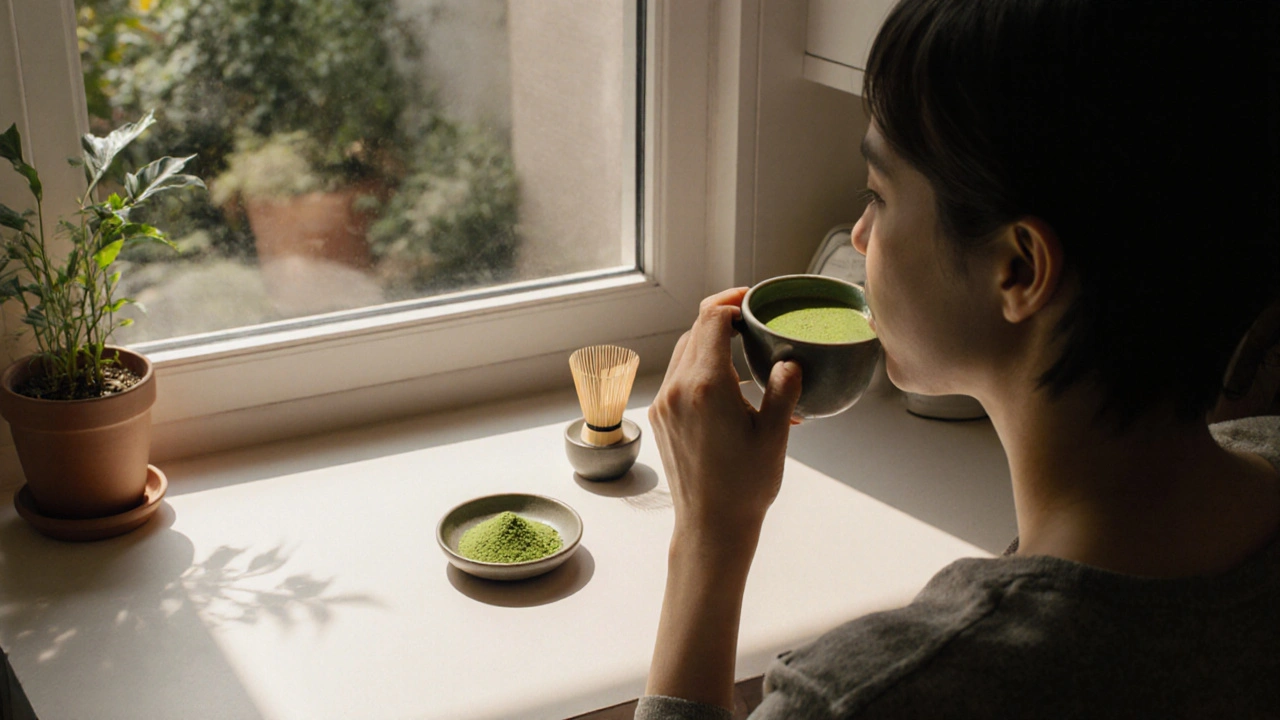
You’ve been there. That mid-afternoon crash hits hard. Your coffee’s gone cold, your energy’s flat, and you’re tempted to grab another can of that sugary energy drink-except you’re trying to cut back on caffeine and calories. You’re not alone. Millions of people are looking for real, lasting energy without the jitters, crashes, or artificial junk. The good news? You don’t need caffeine to feel alert, focused, or energized. There are better, cleaner ways to fuel your day.
Why Caffeine Isn’t the Only Way to Feel Energized
Caffeine works by blocking adenosine, a chemical that tells your brain it’s time to rest. That’s why you feel wired after a cup of coffee. But it doesn’t give you energy-it just hides fatigue. Once the effect wears off, your body catches up, and you crash harder than before. Plus, caffeine can mess with sleep, spike blood sugar, and leave you dependent on it just to feel normal.
Real energy comes from your body’s ability to produce and use fuel efficiently. That means stable blood sugar, good hydration, quality sleep, and nutrients that support mitochondrial function-the tiny power plants in your cells. When those are working well, you don’t need a chemical shortcut to feel awake.
Top 5 Natural Caffeine Alternatives for Sustained Energy
Here are five science-backed, low-calorie options that actually boost energy without caffeine. These aren’t gimmicks-they’re things you can start using today.
1. Matcha Green Tea (with L-theanine)
Matcha isn’t just a trendy latte. It’s ground-up whole green tea leaves, packed with antioxidants and a small amount of natural caffeine-about 35mg per serving, less than half of a cup of coffee. But what makes matcha special is its high L-theanine content. This amino acid slows caffeine absorption, giving you calm, focused energy without the crash. Studies show L-theanine increases alpha brain waves, linked to relaxed alertness. A 2023 study in the Journal of Functional Foods found participants who took matcha reported better concentration and less mental fatigue than those who drank coffee.
How to use it: Mix 1 teaspoon of ceremonial-grade matcha powder with hot water (not boiling) and a splash of almond milk. No sugar needed.
2. Ginseng (Panax ginseng)
Ginseng is one of the oldest adaptogens used for energy. Unlike caffeine, it doesn’t stimulate your nervous system-it helps your body adapt to stress. That means it supports sustained energy without the spike and drop. A 2022 meta-analysis in Phytomedicine found that people who took 200mg of Panax ginseng daily for eight weeks reported improved physical stamina and mental clarity.
How to use it: Look for standardized extracts (4% ginsenosides) in capsule form. Take one in the morning. Avoid taking it late in the day-it can interfere with sleep if you’re sensitive.
3. B-Vitamin-Rich Foods (Especially B12 and B6)
Your body turns food into energy using B vitamins. If you’re low on B12 or B6, you’ll feel tired no matter how much sleep you get. Many people don’t realize their fatigue is a nutrient deficiency, not a caffeine problem.
Good sources: Eggs, nutritional yeast, salmon, spinach, and fortified plant-based milks. A single serving of cooked salmon gives you over 100% of your daily B12. Nutritional yeast (often called “nooch”) has a cheesy flavor and adds a powerful B-vitamin punch to meals. Just two tablespoons provide 100% of your B12 and 50% of your B6.
How to use it: Sprinkle nooch on avocado toast, soups, or roasted veggies. Or take a B-complex supplement if your diet is lacking.
4. Electrolyte Water with Natural Sugars
Dehydration is one of the most common causes of afternoon fatigue. But it’s not just about drinking water-your cells need electrolytes to move fluids and nutrients properly. Sodium, potassium, magnesium, and calcium are essential for nerve signaling and muscle function. Low levels = sluggishness.
Many low-calorie energy drinks use artificial sweeteners and zero electrolytes. That’s why they don’t work long-term. Instead, try adding a pinch of sea salt, a squeeze of lemon, and a teaspoon of raw honey to a glass of water. Honey gives you a tiny, slow-release sugar boost without spiking insulin. Coconut water is another natural option-it has potassium, magnesium, and natural sugars without additives.
How to use it: Keep a reusable bottle with electrolyte mix at your desk. Sip throughout the afternoon.
5. Cold Exposure (Cold Showers or Splashes)
This one sounds strange, but it’s backed by solid research. Cold exposure triggers a surge in norepinephrine, a neurotransmitter that boosts focus, alertness, and mood. A 2021 study in Medical Hypotheses showed that people who took cold showers for 30 seconds to 2 minutes each morning reported higher energy levels and better mood than those who didn’t.
You don’t need to freeze yourself. Start with 15 seconds of cold water at the end of your shower. Gradually increase to 60 seconds. Your body adapts quickly. Within a week, you’ll notice a natural energy lift-not from a chemical, but from your own biology.
What to Avoid: The Fake Energy Trap
Not all “energy” drinks are created equal. Many low-calorie brands still rely on synthetic stimulants like taurine, guarana, or synthetic B-vitamins that your body can’t use efficiently. Guarana, for example, is just another form of caffeine in disguise. Taurine might help with muscle function, but it doesn’t give you energy on its own.
Check labels. If you see “natural flavors,” “maltodextrin,” or “artificial colors,” walk away. These are fillers that do nothing for energy and can trigger inflammation or blood sugar swings.
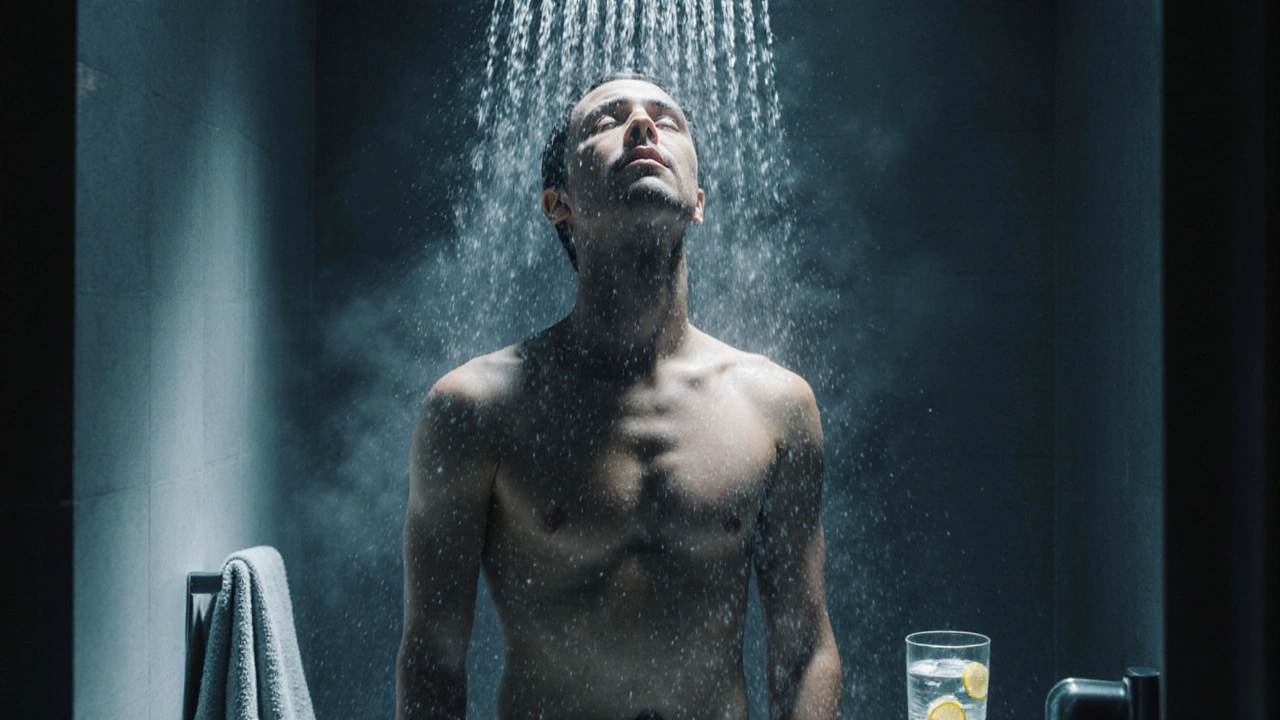
How to Build a Caffeine-Free Energy Routine
Switching off caffeine isn’t about swapping one quick fix for another. It’s about building a system that keeps you energized all day, naturally.
- Start your day with water. Drink 16oz of water before coffee (or your alternative). Dehydration hits fast.
- Eat protein and fat at breakfast. Eggs, Greek yogurt, or smoked salmon stabilize blood sugar better than toast or cereal.
- Move for 10 minutes every 90 minutes. A short walk, stretching, or even dancing to one song boosts circulation and oxygen flow.
- Use matcha or ginseng mid-morning. Not to replace coffee, but to support sustained focus.
- Hydrate with electrolytes in the afternoon. That’s when most people crash-fix the root cause.
- End your day with a cold splash. It resets your nervous system and improves sleep quality.
How Long Until You Feel the Difference?
Most people notice a shift in energy within 3-5 days. The first two days might feel rough-headaches, irritability, brain fog. That’s your body detoxing from caffeine dependence. After day three, you’ll start to feel clearer-headed. By day seven, your energy becomes steadier. You’re not bouncing between highs and lows. You’re just… awake. Calmly, consistently awake.
One client I worked with in Brisbane switched from four energy drinks a day to matcha, electrolytes, and cold showers. Within ten days, she stopped needing naps. Her productivity went up. She didn’t feel wired or jittery. She just felt like herself-without the crash.
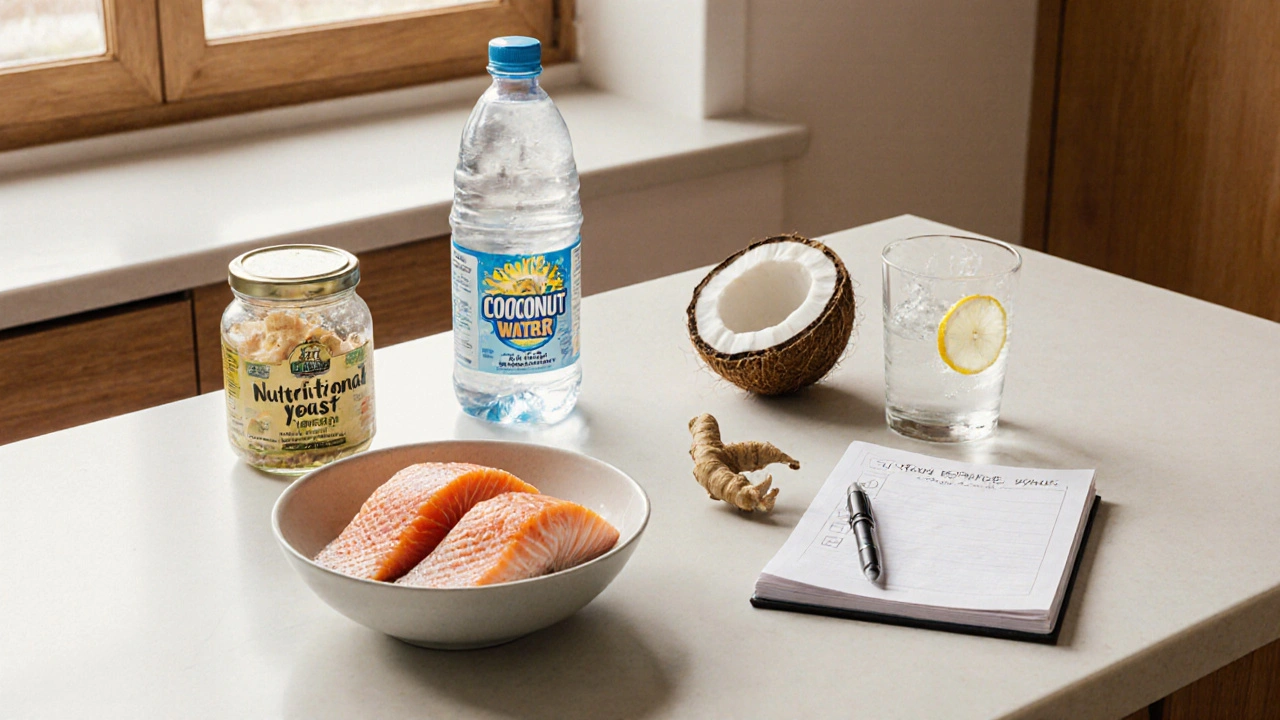
When to See a Doctor
If you’ve tried all these methods and still feel exhausted, it might not be caffeine. Chronic fatigue can be a sign of low iron, thyroid issues, sleep apnea, or vitamin D deficiency. Get your blood work done. A simple CBC and ferritin test can rule out common culprits.
Don’t assume your tiredness is normal. Your body is trying to tell you something.
Final Thought: Energy Isn’t Something You Buy-It’s Something You Build
You don’t need a can labeled “energy” to feel energized. You need good food, clean water, movement, sleep, and a nervous system that’s not constantly on fire from stimulants. The best energy drink you’ll ever have is a glass of water with lemon, a walk outside, and a good night’s rest. Start there. The rest will follow.
Can I get energy without caffeine completely?
Yes. Many people thrive without caffeine. Energy comes from your body’s ability to convert food into fuel, stay hydrated, manage stress, and get enough sleep. Natural alternatives like matcha, ginseng, B vitamins, electrolytes, and cold exposure can replace caffeine without causing crashes or dependence.
What’s the best low-calorie energy drink without caffeine?
There isn’t one perfect commercial product, because most labeled as “low-calorie energy drinks” still contain hidden stimulants like guarana or synthetic B-vitamins. Instead, make your own: mix coconut water, a pinch of sea salt, a squeeze of lemon, and a teaspoon of raw honey. It’s naturally sweet, hydrating, and gives slow-release energy without additives.
Does matcha have caffeine?
Yes, matcha has about 35mg of caffeine per serving-less than half of a cup of coffee. But it also contains L-theanine, which slows caffeine absorption. This creates calm, focused energy without jitters or crashes. It’s a gentler, more sustainable option.
Why do I feel tired even after sleeping enough?
Sleep quality matters more than quantity. Low iron, vitamin B12 deficiency, thyroid problems, dehydration, or blood sugar imbalances can all cause fatigue even after 8 hours of sleep. Try adding more protein to breakfast, drinking electrolyte water, and checking your blood levels if fatigue persists.
How long does it take to stop craving caffeine?
Most people experience withdrawal symptoms (headaches, fatigue, irritability) for 2-5 days. After that, cravings drop sharply. By day 7-10, your body adjusts to natural energy sources. Your sensitivity to caffeine also decreases, so if you ever have it again, you won’t need as much to feel the same effect.

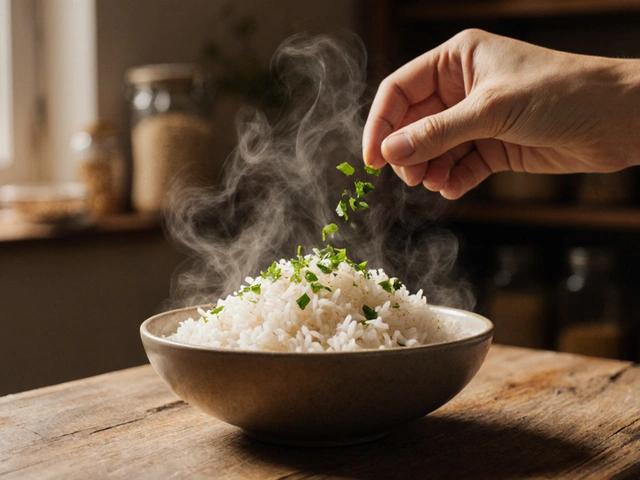
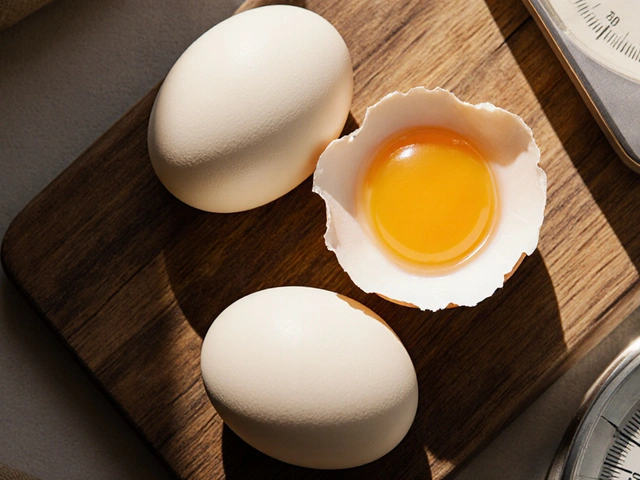
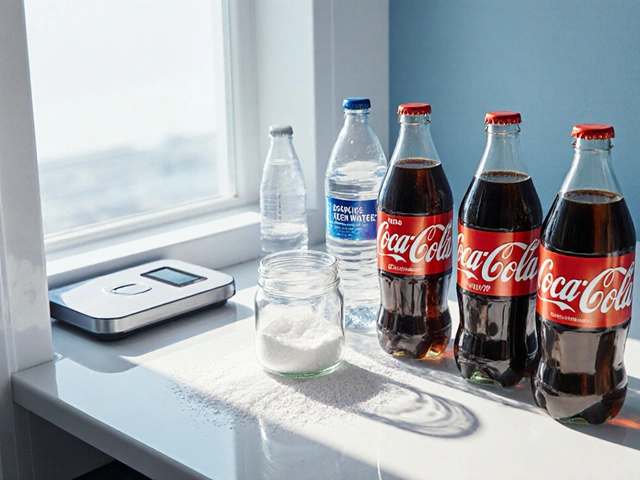
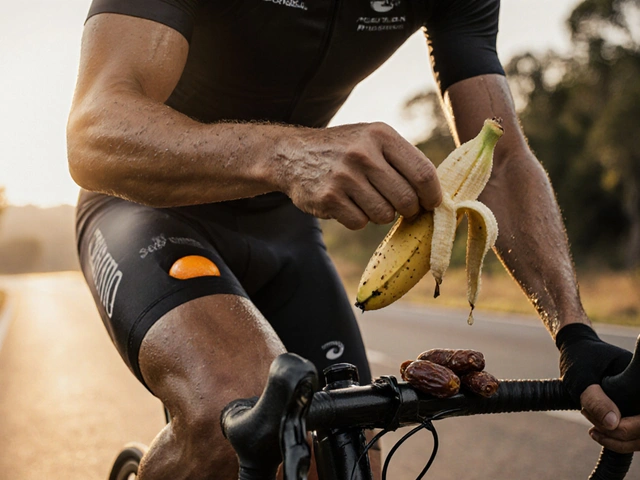
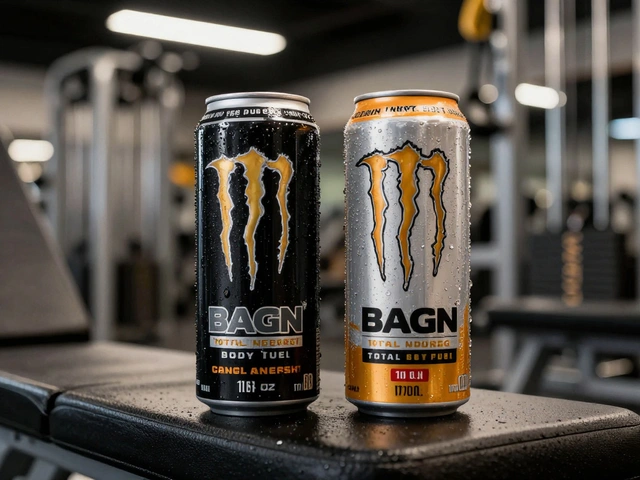
Comments (10)
Akhil Bellam
8 Nov 2025
Oh, so you're telling me I should just... *drink water*? With lemon? Like some kind of 2012 yoga retreat guru? 🤦♂️ I've tried all this 'natural energy' nonsense-matcha tastes like grass clippings, ginseng gave me heart palpitations, and cold showers? Please. I'm not a Norse god. I need something that works, not something that sounds like a TED Talk written by a kombucha salesman.
Amber Swartz
8 Nov 2025
OKAY BUT WHAT IF YOU’RE JUST A SAD, DEHYDRATED, B12-DEFICIENT SOUL WHO’S BEEN LIVING ON ENERGY DRINKS AND TEARS SINCE 2020? 🥲 I DID THIS. I CUT CAFFEINE. I ATE EGG YOLKS. I DRANK COCONUT WATER WITH SEA SALT. I TOOK COLD SHOWERS. I’M NOT THE SAME PERSON. I DON’T NEED TO SCREAM INTO A PILLOW AT 3 PM ANYMORE. I JUST... EXIST. CALMLY. LIKE A MOUNTAIN. 🌿💧
Robert Byrne
10 Nov 2025
First of all, matcha has caffeine. Calling it a 'caffeine alternative' is misleading. Second, ginseng isn't a magic bullet-it’s an adaptogen that *may* help with stress, but it doesn't 'produce energy.' Third, you’re conflating hydration with energy. Dehydration causes fatigue, yes-but so does mitochondrial dysfunction, hypothyroidism, sleep apnea, and depression. You’re oversimplifying a complex physiological issue into a wellness influencer checklist. Also, 'nooch' is not a word. It's nutritional yeast. Use the full term. You're not helping anyone by pretending this is science.
Tia Muzdalifah
10 Nov 2025
i just started sprinklin nooch on everything and omg its like eating cheesy soul. also cold showers? i did it for 15 sec and my brain felt like it got a reboot. like... whoa. i still drink coffee sometimes but now i dont feel like a zombie by 3pm. also ty for not saying 'just meditate' lol
Zoe Hill
10 Nov 2025
i’ve been trying the electrolyte water thing and it’s actually kinda nice? i used to think it was just for athletes but now i keep a bottle at my desk and sip it while i work. no more afternoon fog. also, i didn’t realize how much i was dehydrated until i started drinking water first thing. my skin even looks better?? 🤫
Albert Navat
11 Nov 2025
Let me break this down for you in neurochemical terms: caffeine is a PDE4 inhibitor that increases cAMP, leading to heightened dopaminergic and noradrenergic activity. The alternatives you listed? Matcha’s L-theanine modulates GABA and glutamate, ginseng’s ginsenosides interact with HPA axis regulation, and cold exposure activates TRPM8 receptors triggering norepinephrine release. So yes-these are legit. But you’re missing the bigger picture: circadian rhythm entrainment and mitochondrial biogenesis. No supplement replaces sleep hygiene. Also, if you’re not doing HIIT or resistance training, none of this matters. You’re just rearranging deck chairs on the Titanic.
King Medoo
11 Nov 2025
Look. I used to be a 6-coffee-a-day guy. Then I got diagnosed with adrenal fatigue. My doctor said, 'You're not tired-you're poisoned.' I tried all this 'natural energy' stuff. Cold showers? I cried. Matcha? I gagged. But then-after 11 days-I woke up at 6:30 AM without an alarm. No jitter. No crash. Just... peace. 🌅 I'm not saying this for clout. I'm saying this because I almost died from burnout. If you're still drinking 'energy' drinks after this? You're not lazy. You're in denial. And that's scarier than caffeine.
Rae Blackburn
12 Nov 2025
They don’t want you to know this but matcha is grown with glyphosate in Japan and the L-theanine is synthetically added in China. The whole 'natural energy' thing is a Big Wellness scam to sell you overpriced powders while Big Pharma watches. Your 'electrolyte water' is just sugar water with salt. They’re selling you placebo. Wake up. Your energy problem? It’s the lights. The screens. The Wi-Fi. The fluoride. The government. They’re draining your chi.
LeVar Trotter
12 Nov 2025
I’ve coached dozens of people through caffeine withdrawal. The first 72 hours are brutal-headaches, irritability, brain fog. But after that? It’s like your brain reboots into a new OS. The key isn’t the matcha or the cold showers-it’s consistency. Pick one thing. Do it for 7 days. Then add another. Don’t try to overhaul everything at once. That’s why most people fail. Also-thank you for mentioning ferritin. Too many people assume fatigue = laziness. It’s not. It’s biology. And biology deserves respect.
Tyler Durden
12 Nov 2025
I went cold turkey on caffeine for 30 days. Day 1: felt like a ghost. Day 5: cried over a bagel. Day 12: started walking at sunrise. Day 21: noticed I wasn’t checking my phone every 3 minutes. Day 30: I didn’t miss it. Not one bit. Energy isn’t a substance. It’s a rhythm. And I finally found mine.